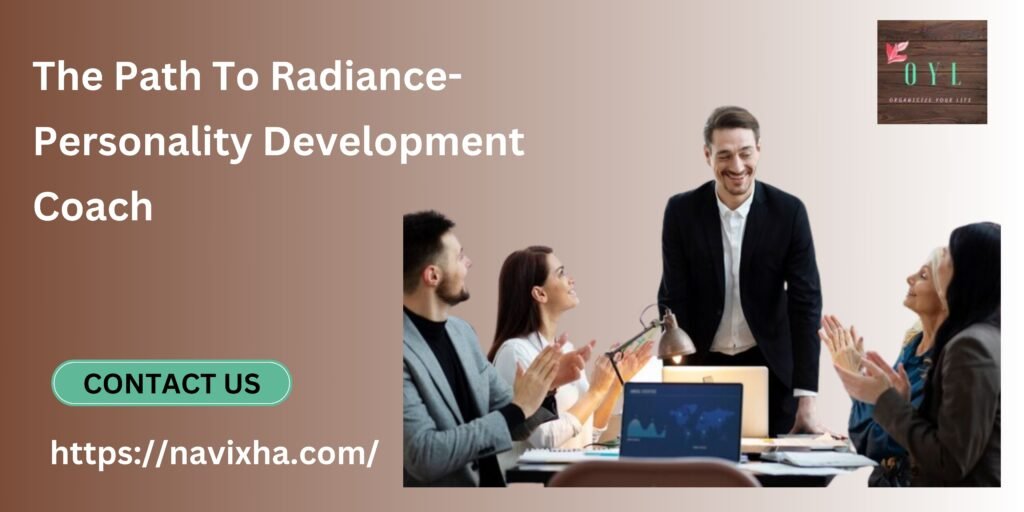“Personality is to a man what perfume is to a flower.” This well-known quote from Charles M. Schwab brilliantly illustrates the main point of personality development- a quest for self-discovery and the living out of one’s true character.
Personality development refers to the enhancement of personal traits and skills towards becoming an all-round appealing individual. It involves different activities that assist in shaping character, capability, and general presence.
This blog will discuss why personality development is important, how it benefits you, the Role Of A Personality Development Coach, And How OYL Consulting Can Help You Transform Through This Journey.
Understanding Personality Development
Improvement of one’s inner and outer self simultaneously to bring about positive change in one’s life, is called personality development. It entails modifications such as boosting confidence levels, enhancing communication skills, increasing knowledge base, developing certain hobbies or skills, and learning fine etiquette to add style and grace to simple functions like walking, talking, gazing, etc. Thus overall creating positivity, vibrancy, liveliness, and peace with oneself.
Benefits of Personality Development
- Enhanced Self-Confidence: Confidence forms part of the most crucial features associated with radiant personalities. It boosts self-respect through personal development.
- Improved Communication Skills: Personal growth programs focus on improving oral and written modes of expression.
- Better Relationships: Better understanding oneself as well as others leads to enhanced relationships.
- Career Advancement: In career growth path stages, strong and pleasant personality traits act as an advantage, often helping you progress into leadership positions
The Role of a Personality Development Coach
A personal development coach can guide individuals in recognizing their strengths and weaknesses while working on developing their overall character. Coaches offer tailor-made approaches that can help boost your persona by setting goals for yourself personally which you achieve as you move through life.
The Path to Radiance
Self-Assessment and Awareness
Personality development starts with assessing oneself. Methods like the SWOT analysis (Strengths, Weaknesses, Opportunities, Threats) are of great help to individuals to get a foundational perspective of themselves at a deeper level. You can say that self-awareness is the groundwork for self-development.
Setting Goals and Objectives
This is the most significant aspect for you to consider when you decide to start developing your personality. SMART (Specific, Measurable, Achievable, Relevant, Time-bound) goals play a vital role in the success of sustained development by concentrating on the specific achievement that results in it.
Developing Core Skills
- Communication Skills: Personality development begins with effective communication. These are things such as clear and confident speech, active listening, and appropriate body language.
- Interpersonal Skills: Empathy, building, maintaining positive relationships, and resolving conflicts form integral parts of interpersonal skills.
- Emotional Intelligence: Personal interactions are significantly influenced by understanding and controlling one’s emotions and feelings from others’ perspectives.
Key Areas of Focus in Personality Development
Confidence Building
Being confident is not only about appearing or feeling good; it also involves the ability to speak out without fear or hesitation. Such strategies as positive affirmations dealing with phobias through exposure therapies, as well as continuous practice, come in handy when trying to develop self-confidence.
Effective Communication
Non-verbal communication, such as gestures and eye contact, is as important as verbal communication. For instance, maintaining eye contact during meetings shows engagement, and active listening with nods or hand gestures enhances communication.
Here are some tips for effective communication:
- Body Language: Use open posture and appropriate facial expressions.
- Tone of Voice: Speak clearly, at a moderate pace, with a friendly tone.
- Active Listening: Paraphrase or summaries to show understanding.
- Empathy: Acknowledge others’ feelings and perspectives.
- Clarity: Be concise and avoid jargon.
- Open-Ended Questions: Encourage dialogue.
- Feedback: Provide specific, constructive feedback.
- Consistency: Align verbal and non-verbal messages.
- Cultural Sensitivity: Adapt to cultural differences.
- Preparation: Know your material and practice your delivery.
By combining these verbal and non-verbal techniques, you can improve communication, build stronger relationships, and convey your message more effectively.
Emotional Intelligence
Emotional intelligence (EI) involves recognizing and managing your own and others’ emotions, crucial for building relationships, reducing stress, and making sound decisions. High EI enhances job satisfaction, productivity, and staff retention, especially during workplace changes.
Key Components
- Self-Awareness: Understanding your emotions.
- Self-Regulation: Controlling impulses and behaviours.
- Motivation: Inner drive and commitment.
- Empathy: Understanding others’ feelings.
- Social Skills: Managing relationships effectively.
Benefits
- Better Relationships: Stronger, positive connections.
- Reduced Stress: Healthier work environment.
- Improved Decisions: Balanced choices.
- Adaptability: Handling change well.
- Higher Job Satisfaction: Better morale and retention.
- Increased Productivity: Greater effectiveness.
- Effective Leadership: Inspiring and guiding teams.
Implementation
- Training: Offer EI programs.
- Feedback: Regular feedback mechanisms.
- Culture: Promote open communication and empathy.
- Leadership: Encourage EI behaviours in leaders.
Prioritising emotional intelligence improves workplace culture, employee satisfaction, and performance, leading to better outcomes during changes.
Leadership Skills
Leadership is all about motivating and guiding others toward shared objectives. Vital skills for effective leadership include determination, responsibility, empathy, persuasion, vision, decision-making, delegation, and adaptability. Leaders show determination by setting clear goals and inspiring persistence even when faced with challenges. They take ownership of their decisions and foster a culture of accountability within their teams. Understanding and empathy help leaders navigate conflicts and create a supportive atmosphere. Persuasion and collaboration are crucial for gaining support and advancing initiatives. Visionary leaders strategically plan for the future and encourage innovation. They make well-informed decisions, entrust tasks wisely, and adapt to changing circumstances with resilience. Continuous learning, mentorship, feedback, and practice are essential for developing and refining these leadership abilities.
Practical Steps and Techniques
Daily Habits and Practices
For one’s character to develop proficiently, consistent daily habits are essential. Personal growth entails activities like setting daily targets, maintaining a journal, inculcating discipline, investing in self-care, and thinking positively about oneself.
Mindfulness and Meditation
Mindfulness and meditation offer profound benefits for personal well-being. By cultivating awareness of one’s thoughts, emotions, and sensations, individuals can effectively reduce stress levels and enhance focus on tasks at hand. Moreover, mindfulness practices contribute to improved emotional regulation, empowering individuals to navigate challenges with greater ease. The transformative impact of these practices on character development is contingent upon the consistency with which they are integrated into daily routines.
Continuous Learning and Development
Continuous learning and development are essential for personal growth and fulfilment. Embracing a mindset of lifelong learning fosters intellectual curiosity and professional advancement. Engaging in activities such as reading books, attending seminars, and seeking constructive feedback fuels ongoing development. These experiences not only expand knowledge but also nurture critical thinking skills and encourage self-reflection. By actively pursuing opportunities for growth, individuals can continuously evolve and adapt to the ever-changing demands of life and work.
The Role of OYL Consulting in Personality Development
Introduction to OYL
OYL Consulting plays a pivotal role in fostering comprehensive personality development, empowering individuals to unlock their fullest potential. Dedicated to cultivating vibrant lives filled with fulfillment, OYL offers a range of programs and services tailored to suit diverse needs.
Programs and Services Offered by OYL
At OYL, individuals can embark on a transformative journey through personalized one-on-one sessions with experienced life coaches. These sessions provide invaluable guidance and support, helping individuals navigate challenges, set meaningful goals, and cultivate positive habits. Additionally, OYL offers dynamic group workshops designed to enhance interpersonal skills and foster personal growth. These workshops, conducted through online classes and other accessible platforms, create enriching environments for learning and collaboration.
How to Get Started with OYL
Getting started with OYL is simple and accessible to all. Prospective participants can explore the array of programs available on the OYL website, selecting those that align with their goals and aspirations. To further support individuals in their decision-making process, OYL offers complimentary consultations. These consultations provide individuals with the opportunity to discuss their needs and objectives, enabling them to make informed choices about their development journey.
With its commitment to holistic development and personalised support, OYL Consulting stands as a beacon of empowerment, guiding individuals toward a life of purpose, growth, and fulfilment.
Conclusion
Personality development plays a vital role in leading a successful and fulfilling life. It involves enhancing various personal traits such as confidence, communication skills, and emotional intelligence, which are essential qualities of effective leadership. Just as every journey begins with a single step, personal growth requires taking proactive steps toward self-improvement. By embarking on the path of personality development, you can witness a transformation in your life, leading to greater radiance and authenticity. Discover the transformative programs offered by OYL Consulting and take that crucial first step toward revealing your true self. Visit the OYL website today to learn more and start your journey of self-discovery and enlightenment.

